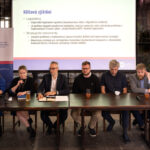"Thank you for being like your comrades in Slovakia," a video from Russian President Vladimir Putin read in Czech.The "deep fake" campaign from the Center for an Informed Society (CIS) aims to draw attention to the dangers of hybrid threats. These threats manifest in a variety of methods, mainly through disinformation, propaganda or espionage, with a single objective – to paralyze institutions, polarize society and thus destabilize states or change their foreign policy. The recent elections in Slovakia are a good example of just how dangerous these techniques can be.
In the 21st century, hybrid threats are a global danger that continue to intensify with the rapid advancement of digital technologies, and the Czech Republic is not safe nor protected adequately. "Czech political leaders have previously claimed in their statements that hybrid threats and defense against disinformation are a priority for them. However, real progress in terms of concrete measures has been minimal so far," says Andrea Michalcová, the Director of CIS.
According to the Center for an Informed Society, the greatest and most urgent threats are:
- Lack of legislation against hybrid threats and disinformation,
- Insufficient implementation of existing strategic and conceptual documents, where their implementation is often not required,
- Lack of departments to combat hybrid threats,
- Lack of qualified experts in strategic communication and dealing with hybrid threats,
- Insufficient comprehension of the topic among politicians, underestimation of threats or politicization of the topic.
A storm is coming to Tatras: The Hybrid Threat"
"Slovakia today is an example of how insufficient preparation for these potential threats can affect elections and the overall functioning of a state," says Daniel Milo, an analyst at the NEST Institute.
There is no comprehensive legislation on this issue neither in Slovakia nor Czech Republic. Most state institutions do not have dedicated units to combat hybrid threats, and where such units do exist, their funding and staffing are often insufficient. Slovakia today is an example of how a lack of preparation for these potential threats can affect elections and the overall functioning of the state.
"The lack of strategic communication implemented by the state, irresponsible behavior of social networks and the decline of citizens' trust in democratic structures – these are among the main factors that cause vulnerability to disinformation," explains Veronika Víchová, CIS analyst.
"Since the beginning of the Russian aggression against Ukraine, the level of perceived threat in the Czech population has noticeably increased. The logical role of the government now is to calm the situation and communicate the security measures it has already taken or is planning to take," adds Jiří Táborský, an analyst at the STEM research institute.
Where is my home? Where we effectively resist foreign influence and Russian interference
Since 2023, the Center for an Informed Society has been advocating a few key steps to strengthen the fight against hybrid threats. Among other things, they have been pushing for the swift passage of the Digital Economy Act and amendments to the Criminal Code on espionage and cooperation with foreign powers, especially in light of Russia's growing activities.
At a non-legislative level, CIS proposes an increase of professional and financial capacities, the establishment of an independent commission which will oversee strategies, and to systematically train government officials, for whom CIS holds regular roundtables. It is also essential to improve information exchange and strengthen cooperation with NGOs, academic institutions and the private sector.
According to experts, the first steps should therefore be to fast-track the adoption of key measures such as the full implementation of the EU Anti-Breach Directive and the so-called Confiscation Directive, as well as to strengthen the coordination and cooperation in the fight against hybrid threats.
"When it comes to the anti-money laundering legislation and ensuring the effectiveness of international sanctions, the Government has two options. Firstly, the Anti-Money Laundering Act, which would solve the long-standing problem of 'flow-through accounts' which also implements the EU Confiscation Directive. Secondly, an amendment to the Criminal Code, which in turn reflects the EU directive against sanction violations," says Lukáš Kraus, head of the analytical team at the organization Reconstruction of the State, who in early July called on the government to accelerate its priorities for a stronger, more resilient and democratic Czech Republic.
With www.pojistkydemokracie.cz as partners of this project, CIS is focused on ensuring the adoption of key legislative changes and creating effective mechanisms to guarantee that the Czech Republic remains resilient to hybrid threats.
"If the Czech government and society do not realize the severity of hybrid threats and take the necessary steps in the form of legislative and non-legislative measures, we may suffer the same fate as Slovakia," Michalcová concludes.








